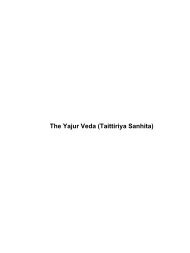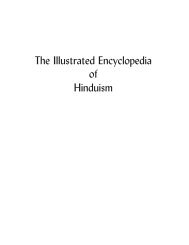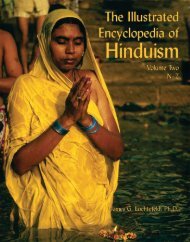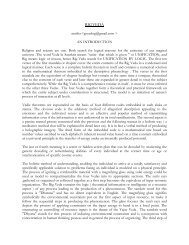A Concise Encyclopedia of Hinduism Klaus K Klostermaie
Create successful ePaper yourself
Turn your PDF publications into a flip-book with our unique Google optimized e-Paper software.
ghï 74<br />
ghï<br />
Clarified butter, an ingredient <strong>of</strong> many<br />
SACRIFICES and PÜJÄS, such as the Vedic<br />
sacrifice homa, in which ghï is thrown<br />
into fire.<br />
Gho•ä<br />
Daughter <strong>of</strong> the ø•i (sage) Kak•ïvat. She<br />
was afflicted with leprosy, but the<br />
AŸVINS cured her late in life, and<br />
bestowed beauty and youth on her so<br />
that she could marry.<br />
ghosts<br />
See BHÜTA; PRETA.<br />
gifts<br />
See DÄNA.<br />
Giridhara<br />
(‘the upholder <strong>of</strong> the mountain’)<br />
Epithet <strong>of</strong> Kø•æa, who held Mount<br />
Govardhan up high in order to protect<br />
the shepherds <strong>of</strong> Vraja from torrential<br />
rains sent by Indra.<br />
Girijä (‘mountain-born’)<br />
A name <strong>of</strong> DEVÏ.<br />
gïtä (‘song’)<br />
A religio-philosophical text in the form<br />
<strong>of</strong> an epic poem. The best known is the<br />
Bhagavadgïtä, which is found as an<br />
insert in the sixth book <strong>of</strong> the<br />
Mahäbhärata. Other well-known gïtäs<br />
are the Upagïtä, also found in the<br />
Mahäbhärata, and the Bhrämaragïtä.<br />
Gïta-govinda<br />
Famous poem by JÄYADEVA, celebrating<br />
the love <strong>of</strong> Kø•æa and the GOPÏS, influential<br />
for the development <strong>of</strong> GAU¥ÏYA<br />
VAIÆŒAVISM.<br />
Gïtä-rahasya (‘secret <strong>of</strong> the Gïtä’)<br />
A work by B. G. TILAK interpreting the<br />
Bhagavadgïtä as a ‘Gospel <strong>of</strong> action.’<br />
Glasenapp, Helmut von<br />
(1891–1963)<br />
German Indologist and scholar <strong>of</strong><br />
religion, who taught mainly at<br />
Königsberg and Tübingen, and promoted<br />
the knowledge <strong>of</strong> Indian religions, especially<br />
<strong>Hinduism</strong>, through many scholarly<br />
and popular works: Der <strong>Hinduism</strong>us<br />
(1930); Die Religionen Indiens (1943);<br />
Die Philosophie der Inder (1949); Das<br />
Indienbild deutscher Denker (1960).<br />
go<br />
See COW.<br />
goat (aja)<br />
The most frequently used animal for<br />
Vedic SACRIFICES. Goats are still <strong>of</strong>fered<br />
to KÄLÏ (2) on a regular basis. Aja also<br />
means ‘unborn’, and many interesting<br />
speculations make use <strong>of</strong> the double<br />
meaning <strong>of</strong> the word.<br />
God and gods<br />
Many outsiders are fascinated to learn<br />
that Hindus worship 330 million (thirtythree<br />
crores) gods. There is no record <strong>of</strong><br />
the names <strong>of</strong> all <strong>of</strong> these, <strong>of</strong> course, and<br />
the figure serves to indicate that the<br />
number <strong>of</strong> higher powers is unimaginably<br />
high. There are lists <strong>of</strong> gods that go<br />
into the hundreds and there are litanies<br />
<strong>of</strong> names <strong>of</strong> major gods, such as Ÿiva or<br />
Vi•æu, that enumerate a thousand<br />
names.<br />
The English word God/gods stands<br />
for a great many Hindu (Sanskrit) terms<br />
that have clearly differentiated meanings.<br />
The most commonly used word is<br />
DEVA or devatä, generically applicable<br />
to all higher powers and also liberally<br />
used by Hindus when addressing an<br />
important human being, who is honoured<br />
by the title ‘Deva’. Deva is everything<br />
that reveals something unusual or<br />
uncommon, that exercises power and<br />
influence, or that is helpful or harmful.


















